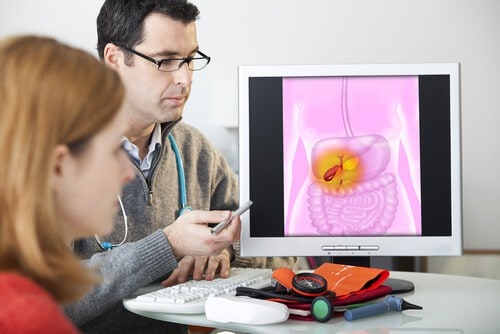Gallbladder Removal After Gastric Sleeve
 Gallbladder removal after gastric sleeve surgery is a common part of bariatrics. Having your gallbladder removed can actually make you feel better.
Gallbladder removal after gastric sleeve surgery is a common part of bariatrics. Having your gallbladder removed can actually make you feel better.
Your gallbladder is a very small organ located in your right upper abdomen, just below your liver. Its job is to collect bile and then store it, which the gallbladder will use to help the liver with the digestion of fatty and high-cholesterol foods.
Gallstones are quite a common occurrence in the general population but are especially prevalent in both people who are obese and those who tend to lose weight fast.
But gallstones aren’t the only problem – sometimes the gallbladder gets inflamed or infected, which is why it needs to be surgically removed.
The Relationship Between Gallbladder and Gastric Sleeve
One of the health risks that obese people face is issues with their gallbladder. The overload of fat and cholesterol, resulting from a high-calorie diet, can put a strain on many of the body’s systems and can lead to a cholesterol build-up in the gallbladder and liver.
Gastric sleeve surgery helps obese people lose weight, thus helping to protect them from a wide array of obesity-related health complications – including severe problems with the gallbladder. The irony is that about a quarter of people who have weight loss surgery end up with gallbladder issues due to the rapid pace of weight loss.
About Gallbladder Disease
You should be aware of the signs and symptoms of gallbladder disease if you are undergoing gastric sleeve or other kinds of weight loss surgeries.
Typically, the primary symptom will be severe pain in the upper right abdominal zone following a high-fat, spicy, or high-cholesterol meal. Other symptoms that accompany the ingestion of these meals or gallstone pain include:
- Gas
- Indigestion
- Nausea
- Vomiting
- Pain in the upper right shoulder
Gallbladder Removal Surgery
Like the appendix, your gallbladder is not entirely necessary to your survival. The only change is where bile ends up. Because you remove the gallbladder, there is no reservoir of bile. So you may experience some digestion issues because bile is not being readily sent to the small intestine, but if you are not consuming extremely fatty foods (which post-gastrectomy, you shouldn’t be), then you probably won’t notice any difference.
You also shouldn’t be worried about the surgery itself. It is a very routine operation, with little risk of complication. Furthermore, your surgeon will most likely check you for gallbladder problems before gastric sleeve surgery. And if problems are detected (even if you haven’t felt anything wrong), your surgeon will likely present you with the option to remove most of your stomach and the entire gallbladder at the same time.
Sometimes surgeons will recommend or prescribe medications to prevent gallstone formation after surgery, but the problem with this treatment is that patients are still at risk of developing stones or other problems after they are done taking medication.
If you find yourself facing gallbladder problems after gastric sleeve, don’t worry if you need to have it taken out. It’s a common part of weight loss operations, and it will make you feel better. It doesn’t mean the operation or your efforts have been unsuccessful – it’s just your body responding to a dramatic change.
Find out if you qualify for the Gastric Sleeve Surgery in Tijuana Mexico by clicking through to our online application form or contact us today to find out more.
[button link=”https://jetmedicaltourism.com/apply/” type=”big” color=”blue” newwindow=”yes”] See If You Pre-Qualify[/button]
[button link=”https://jetmedicaltourism.com/contact/” type=”big” color=”blue” newwindow=”yes”] Contact Us Today[/button]

